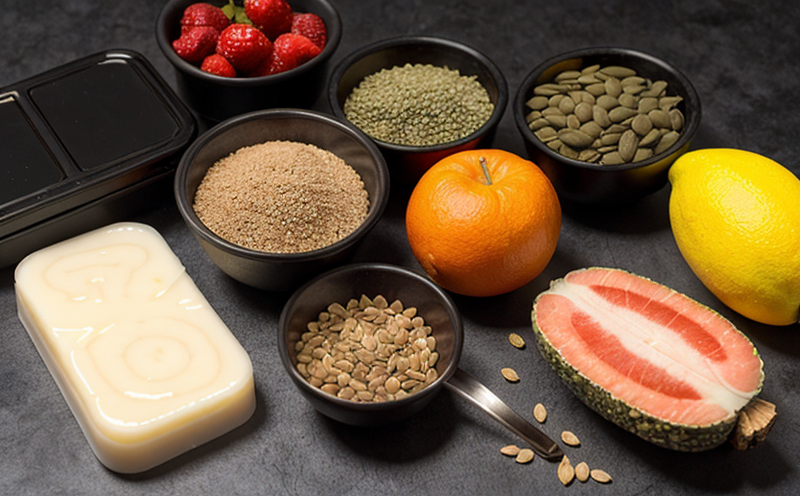EN 15214 Determination of Insoluble Dietary Fiber in Bakery Products
The determination of insoluble dietary fiber (IDF) is crucial for the food and feed industry, especially when it comes to bakery products. Compliance with international standards such as EN 15214 ensures that food manufacturers can accurately assess the IDF content in their products, thereby meeting consumer expectations and regulatory requirements.
The process of determining IDF involves a series of steps designed to isolate and quantify the insoluble fiber present within the bakery product. This testing is not only important for nutritional labeling but also plays a significant role in enhancing the health profile of these products. Understanding the IDF content helps food developers make informed decisions regarding ingredient formulation, ensuring that the final product meets both regulatory standards and consumer demands.
EN 15214 provides detailed methodologies and guidelines for conducting this analysis accurately. The standard outlines specific procedures to ensure precise measurement, including sample preparation, extraction methods, and analytical techniques. By adhering strictly to these protocols, laboratories like ours can deliver reliable results that contribute significantly to the overall quality of bakery products.
The significance of IDF lies in its contribution to digestive health. Insoluble fiber does not dissolve in water but passes through the intestines largely intact, providing various benefits such as improving bowel movements and promoting satiety. In bakery products, ensuring adequate levels of IDF can enhance the product's nutritional value, making it more appealing to health-conscious consumers.
For manufacturers aiming to meet consumer preferences for healthier alternatives or those targeting specific dietary needs (e.g., low-carb diets), accurate measurement and reporting of IDF are essential. This information helps in formulating products that not only comply with regulatory standards but also offer genuine nutritional advantages to the end user.
Moreover, compliance with EN 15214 is vital for maintaining market access across different regions. Regulatory bodies worldwide recognize international standards such as this one, ensuring consistency and reliability in product testing. This recognition supports global trade by reducing barriers related to non-compliance issues.
In summary, the determination of IDF using EN 15214 serves multiple purposes – enhancing product quality, meeting regulatory requirements, addressing consumer health concerns, and facilitating international trade. For businesses operating within this sector, investing in accurate IDF analysis through certified laboratories ensures longevity and success in an increasingly competitive market.
Benefits
- Enhanced Nutritional Labeling: Accurate measurement of IDF helps companies provide truthful information about their products' nutritional content, which is crucial for transparency and trust with consumers.
- Informed Decision-Making: Understanding IDF levels allows manufacturers to optimize ingredient formulations, leading to better product development and market positioning.
- Improved Health Claims: By ensuring appropriate IDF levels, businesses can support health claims made about their products, potentially attracting a broader customer base.
- Compliance with Regulations: Adherence to international standards like EN 15214 ensures that bakery products meet all necessary legal requirements and avoid potential penalties or recalls.
- Better Consumer Satisfaction: Providing accurate nutritional information fosters greater customer satisfaction, which can lead to higher repeat purchases and positive brand associations.
- Easier Market Access: Compliance with international standards simplifies the export process by meeting pre-set criteria for various countries, thus opening up new markets.
Eurolab Advantages
At Eurolab, we pride ourselves on delivering exceptional services that meet and exceed the highest industry standards. Our expertise in performing EN 15214 testing for the determination of insoluble dietary fiber in bakery products is unmatched.
We utilize state-of-the-art equipment and methodologies to ensure accuracy and precision in our analyses. Our team of highly qualified professionals adheres strictly to international guidelines, ensuring that every test conducted meets stringent quality controls. This dedication guarantees reliable results that are trusted by leading companies across the globe.
Our commitment extends beyond just performing tests; we also offer valuable insights into how these results can impact your business strategy. Whether you're looking to enhance product formulation or improve labeling accuracy, our consultants provide actionable advice tailored specifically for your needs.
In addition to technical excellence, Eurolab prioritizes customer satisfaction by offering flexible service options and responsive support throughout the testing process. From initial consultation through final report delivery, we strive to ensure a seamless experience that adds value beyond mere compliance.
Choosing Eurolab means choosing partners who are dedicated to helping you achieve your business goals while maintaining the highest standards of integrity and reliability in food safety and quality assurance practices.
Quality and Reliability Assurance
EuroLab is committed to delivering consistent, high-quality results through rigorous internal procedures and external accreditation. We maintain our commitment by participating in proficiency testing programs organized by internationally recognized organizations such as APLA (Association of Public Analysts Laboratories) and EURACHEM.
Our ISO/IEC 17025 accredited laboratory ensures that all tests are conducted under controlled conditions, using calibrated instruments and reagents. This guarantees the accuracy and precision required for precise IDF measurements according to EN 15214.
The use of advanced analytical equipment like gas chromatography, high-performance liquid chromatography, and spectrophotometers allows us to perform thorough analyses that meet or exceed specified tolerances. Our skilled technicians ensure each step of the process—from sample preparation to final interpretation—is meticulously executed.
Furthermore, we employ continuous training programs for our staff to stay updated on the latest developments in analytical techniques and methodologies. This proactive approach ensures that our laboratory remains at the forefront of scientific advancements relevant to food testing.
EuroLab’s unwavering focus on quality control translates into consistent accuracy across all services provided, including EN 15214 compliance for determining insoluble dietary fiber in bakery products. Our rigorous adherence to international standards and best practices ensures that every analysis conducted here meets the highest levels of reliability and trustworthiness.





